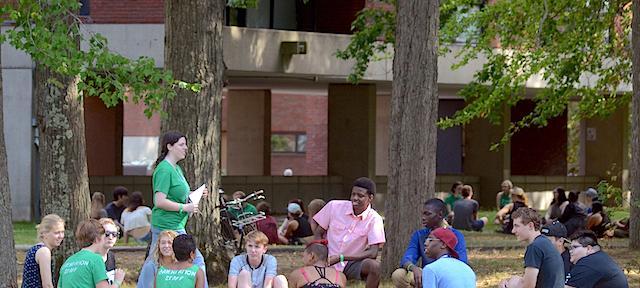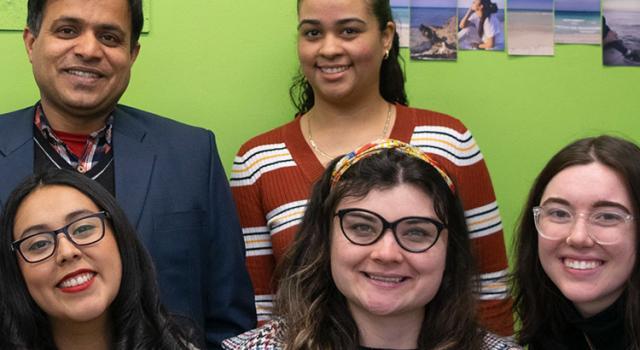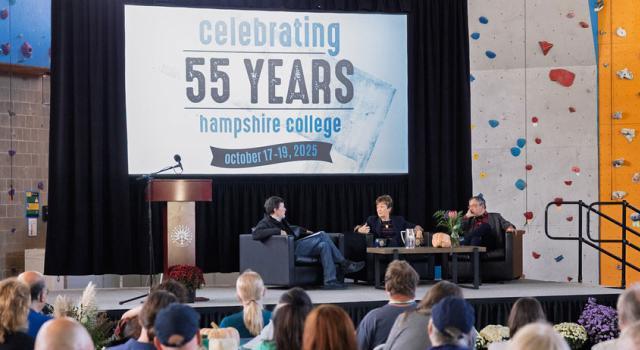New Class of Students Urged to Own Their Education, at Orientation Shaped by Students

Some 400 members of Hampshire’s 47th entering class started college with an immersive, four-day orientation the first week in September, and participated in a range of activities designed and hosted by Orientation student leaders. Hampshire’s practice of inviting students to co-lead orientation programming attracted the attention of one of the largest global media outlets, the Guardian.
Just as Hampshire's experiential education calls for students to design their own concentration, the College welcomes student Orientation leaders to create and produce custom programming for the newest incoming class. The result this year was a highly personal, student-centered event that encouraged participation in an eclectic range of activities and workshops, such as:
- zine making
- theater and improv
- veganism
- video-game development
- “See your brainwaves” (hosted by cognitive science students)
- a walk in the Hampshire woods
- an ecological design collaborative
- Embodied Leadership Project, in which students develop leadership skills through play and body movement to music and rhythms
President Jonathan Lash thanked the many staff members and students who produced Orientation, and encouraged the newcomers to be the owners and operators of their education. “Hampshire is a place designed for active users,” he said. “A central part of our education is student involvement in the community, which takes many forms. Students serve as members of the College’s board and, along with faculty, as members of our five schools. They even serve on our budget and priority committee and on the committee on faculty appointments and promotions.”
President Lash added that he’s not aware of another college that includes students in basic governance to this degree.
Director of New Student Programs Jessica Ortiz, who oversees Orientation, says new students, in groups, participate in the weekend’s major events with their professor from a first-semester tutorial, so the friends they make during this four-day period will be in class together all fall. This professor also serves as the first-year adviser for that group. Examples of the 29 distinctly Hampshire seminar courses for new students and the professors teaching them this semester are:
- Philosophy and Science of Emotions, Laura Sizer
- Syria and the Refugee Crisis, Omar Dahi
- The Partition of India, Uditi Sen
- Black Protest Traditions in African American Dance, Amy Jordan
- History of the American Relationship with the Middle East, Aaron Berman
- Reading the Graphic Novel, Michele Hardesty
- Freedom Dreams: Interdisciplinary Study of African Descendants, Chris Tinson
- Race and Human Variation, Alan Goodman
- Pollution and Our Environment, Dula Amarasiriwardena
- Cognitive Science: Minds, Brains & Intelligent Machines, Neil Stillings
- Hampshire Media Arts: Feminists Behind the Camera, Hope Tucker
- Sculpture, Gregory Kline
- Food and Health, Elizabeth Conlisk
- War Narratives: Voices from the Colonial Project, Uzma Khan
- Knowledge, Ignorance, Stupidity, Christoph Cox
Because social justice is central to Hampshire’s mission, Orientation introduces students to complex issues of power, privilege, oppression, identity, and racism, sexism, and many other -isms. Discussions of identity encompass the myriad ways in which people may identify, says Ortiz. Among them is the use of pronouns, as Hampshire values individual expression and honors each individual’s wishes for how they want to be acknowledged.
Orientation leaders are also trained not to make assumptions about how students identify, Ortiz says. For example, they do not presume that all students have a traditional concept of home.
“We introduce new students to foundational language around power, privilege, and oppression,” she says. “It’s part of our institutional values for students to critically engage in these discussions. We want students to feel empowered.”
Examples of how these topics were represented:
- This summer, all students were asked to read Create Dangerously: The Immigrant Artist at Work, by Haitian-American author Edwidge Danticat, and faculty advisers led their groups in discussions of this common reading.
- During the four-day event, there were meet-and-greet activities for LGBTQ students, international students, students of color, and first-generation students, as well as for many other identities.
- Students attended Our Identities, Our Community, a three-hour foundational identity workshop designed to help new students better understand their own multitude of identities, the ways in which they intersect, and how they inform their experiences at Hampshire and in society.
- The college hosted “Mixed-Race Mixtape: An Interactive Hip-Hop Theatre Experience,” a live concept rap performance that follows its storyteller, Fig, through experiences of and challenges to identity growing up as a mixed-race Chicano in California. Hampshire alum Andrew Figueroa developed the show as his Division III project and is now performing it nationally through Smartt Productions, which is led by alum Allison Smartt. The performance was followed by a Q&A with cast and crew, such as alum Jorrell Watkins, who is the artistic director. (See http://www.mixedracemixtape.com/)
Hampshire also introduced first-years to the College’s student services, resources, and norms for community living in coordination with Residence Life and Housing; the Office of Student Conduct, Rights, and Responsibilities; and other campus offices. “For many students, it’s the first time living away from home. We want to be sure that students understand the responsibilities they have to one another and to the larger campus community,” Ortiz said.
Among the activities for this component of Orientation were discussions of policies, services, and resources related to substance use and sexual misconduct. This year, two Orientation leaders developed and hosted a student conversation about sexual health and safer sex. And again this year, as part of the College’s year-round sexual-assault prevention and education program, Hampshire hosted a theatrical piece written by Hampshire and Five College alums and students entitled Consensual Sensual: Sexual Violence Prevention and Consent.
This piece, also presented at Mount Holyoke College, comprises fictional vignettes across sexual identities and partnerships performed by Five College students in confessional monologues and examples of consent conversations, bystander strategies, and stories of support for both survivors and those who have perpetuated violence. Afterward, Orientation groups met and discussed the topics. Ortiz says that based on feedback in recent years, this performance is consistently one of the most highly regarded Orientation activities.



